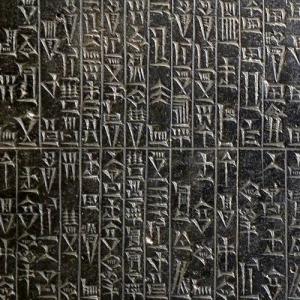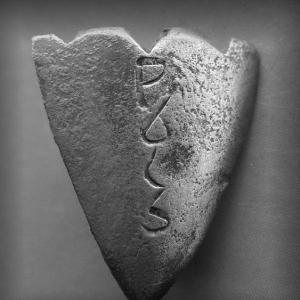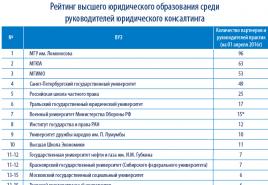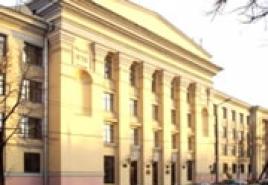Sechenov Medical Institute: faculties and specialties. first mgmu im
schedule Working mode:
Mon., Tue., Wed., Thu., Fri. from 09:00 to 18:00
Latest reviews First Moscow State Medical University. THEM. Sechenov
Victor Zuev 17:35 05/24/2013In my time at the First Moscow State Medical University. THEM. It was very difficult for Sechenov to enter, the competition was simply huge, which is understandable, because this university is considered one of the best medical schools in the country. People came here not only from Russia but also from neighboring countries. With my "high" grades, I only miraculously managed to enter. Our groups were not large, fifteen or twenty people each. Our educational process was well organized. Pre...
Gallery THEM. Sechenov



general information
Federal State Autonomous Educational Institution of Higher Education First Moscow State Medical University named after I.M. Sechenov of the Ministry of Health of the Russian Federation (Sechenov University)
Colleges THEM. Sechenov
- College First Moscow State Medical University. THEM. Sechenov
License
No. 02587 is valid Indefinitely from 05/11/2017
Accreditation
No. 02636 valid from 07/04/2017
Monitoring results of the Ministry of Education and Science for the First Moscow State Medical University. THEM. Sechenov
| Index | 2019 | 2018 | 2017 | 2016 | 2015 | 2014 |
| Performance indicator (out of 5 points) | 4 | 5 | 7 | 6 | 5 | 6 |
| Average USE score in all specialties and forms of education | 80.26 | 80.56 | 79.57 | 78.90 | 80.80 | 80.77 |
| Average USE score credited to the budget | 83.83 | 87.7 | 82.98 | 89.78 | 90.96 | 91.95 |
| Average USE score enrolled on a commercial basis | 72.16 | 72.48 | 71.73 | 69.18 | 68.49 | 71.8 |
| The average for all specialties is the minimum USE score enrolled in the full-time department | 58.23 | 59.12 | 54.18 | 51.33 | 41.30 | 54.22 |
| Number of students | 15903 | 15555 | 15403 | 15624 | 15253 | 13573 |
| full-time department | 15689 | 15329 | 15160 | 15042 | 14151 | 12057 |
| Part-time department | 4 | 38 | 61 | 144 | 452 | 714 |
| Extramural | 210 | 188 | 182 | 438 | 650 | 802 |
| All data | Report | Report | Report | Report | Report | Report |
University Reviews
About First Moscow State Medical University THEM. Sechenov
First Moscow State Medical University. Sechenov is one of the oldest universities in Russia, which in 2008 turned 250 years old. At the moment, MSMU them. Sechenov is one of the largest complexes for training future doctors and pharmacists, as well as certification and advanced training of practitioners.
The structure of the University. Sechenov
The university complex includes a clinical center where students do their practice. This center includes 5 clinics with 3,000 beds and 11 laboratories where a wide variety of tests are carried out. There is also a central clinical laboratory and 16 clinical diagnostic services. Therefore, about 44,000 patients can be treated here annually, and 250,000 outpatients. The clinical center also includes a polyclinic for employees and students of Moscow State Medical University, a scientific library, the fund of which is more than a million different textbooks, as well as a museum of the history of the development of medicine.
The entire university complex includes 109 buildings with a total area of about 140 thousand square meters, as well as 20 educational buildings where lectures and practical classes are held. The university trains 9,000 students, both from Russia and from other countries. They receive education at medical, preventive, dental, pediatric faculties, as well as pharmaceutical, higher nursing education and preventive medical faculties.
On the basis of the university there is a faculty for preparing applicants for entering the university. Here you can get preparation for the Unified State Examination in biology, chemistry and the Russian language at preparatory courses, as well as specialized additional education in special biomedical classes. Thanks to this preparation, applicants successfully pass the final exams, in which they receive high scores and easily enter the Moscow State Medical University. Sechenov. Also, at the First Medical University, you can get additional education, undergo residency, internship and postgraduate studies.
Scientific activity of Moscow State Medical University. Sechenov
In 1990, a research center was set up on the territory of the university, which unites all the scientific departments of MSMU and conducts scientific work. Here students unite with their teachers and professors in order to develop and introduce experimental experience into the educational process new principles and opportunities.
The tasks of the scientific center are:
- Conducting various studies to resolve topical problems in medicine and health care.
- Assistance in improving the quality of education of university students.
- Consulting work, where each student can significantly increase the level of their knowledge through close communication with their teachers.
- Advertising scientific achievements in the field of medicine, which will allow students to keep abreast of all the discoveries that have been made, and possibly try to make a breakthrough in the pharmaceutical, medical or biological industry themselves.
Thanks to the research carried out at the center, students then write successful dissertations and receive the titles of candidates and doctors of science. In addition, these scientific studies not only help them broaden their horizons, but are also an undeniable advantage in employment.
Student organizations of MSMU
On the basis of the university, a volunteer center "The Little Prince" was created. Friendly relations have developed between the participants of the center, because their goal is to help those who need it. The center's projects are always striking in their scope, so students are always helped in the implementation of their ideas by the administration of the university. On the center's business, the guys travel not only to different parts of the country, but once even visited London, where they worked at the Summer Olympics.
Talented university students are talented in everything. Therefore, on their own, they organized the New Art Cultural Center, where those who can play musical instruments can become part of a classical music ensemble, actors can reveal their talent in the youth chamber theater, vocalists and dancers will also find a studio to their liking.
Also, anyone can join the trade union, which deals with the social and legal protection of students, and also provides assistance to those who need it. The guys, together with the administration of the Moscow State Medical University. Sechenov strive to do everything that students were comfortable studying at the university. Thanks to the work in the trade union, students learn to work in a team, to overcome the existing difficulties, and therefore it is easier for them to then join the labor activity in their chosen specialty.
student vacation
The traditions of the university have been developing for more than one year, so MSMU students are able not only to study and work, they know a lot about recreation. Traditionally, the students' day is celebrated within the walls of the university, a festival is held where the guys show their vocal and dancing talents, an assembly day and many other exciting events. And first-year students are immersed in student life with a fun Freshman's Day and initiation into medical students, where they take the Hippocratic Oath.
Also, in their free time from school, they can go in for sports at the Burevestnik stadium, wander around the botanical garden full of beautiful trees and flowers. And in the summer they can go to the Sechenovets sports and recreation camp, where they can become closer friends with each other and become one team.
The average result of the Unified State Exam for applicants to the First Moscow State Medical University. I.M. Sechenov was 94 points. In total, about 2.5 thousand people entered this university in 2016. This was reported to the Moscow City News Agency by the press service of the university.
“The average score, as in the previous year, remains high. It amounted to 94 for the budgetary form of education in health care specialties,” the agency’s interlocutor said.
According to him, in total in 2016, applications for admission to the First Moscow State Medical University. I. Sechenov was submitted by about 32 thousand graduates, of which 2 thousand 487 became first-year students.
“The maximum competition was 96 people for a place in the specialty “Medical Biochemistry”. For training in an innovative educational program - the profile "doctor-researcher" (specialty "General Medicine") - introduced this year, the average USE score of those who entered was 98. More than 90% of those recommended for enrollment are winners or winners of the final stage of the All-Russian Olympiad for schoolchildren, At the same time, six people are winners of the Sechenov Olympiad in Chemistry and Biology,” the university noted.
Earlier, Oleg Salagay, Director of the Department of Public Health and Communications of the Ministry of Health of the Russian Federation, said that the average USE score for applicants from Russian medical universities today is 10 points higher than the average.
One of the hostels of the First Med:





Information about the university
Admission to the institute is a fundamental event for every graduate. After all, the future profession, and as a result, life in general, depends on the choice of a place to receive higher education. Of course, you can finish both 2 and 3 universities, but you can lose such precious time, so it is advisable to initially make the right choice of university. So, if you decide to study in Russia, and want to connect your future life with medicine, then the First Moscow State Medical University named after I.M. Sechenov.
This educational institution is the leading one in Russia, which trains the best medical workers, and its emergence is associated with the 18th century. (1758). The history of the university knows many transformations and reorganizations, starting from the structural unit of the modern Moscow State University (which the university was when it was created) and ending with the formation of an independent university, although with frequent name changes (the modern name was received in 2010 and became the fifth in the history of the educational institutions).
The motto of the university is the Latin phrase "Primus inter pares" ("First among equals"). MSMU justifies this slogan, as it ranks 30th (out of 1542) among Russian universities, 13th (out of 225) among Moscow universities and 3rd (out of 83) among higher education institutions of health and sports. This rating makes the university one of the best in Russia.
At the present stage, the university is the largest educational and scientific complex, which is engaged not only in the training of new specialists, but also in the advanced training of certified medical workers and pharmacists.
To implement the educational tasks set, MSMU has a branched structure, which includes faculties focused on educating the best medical workers of various profiles:
- Medico-prophylactic (a faculty that arose in 1930 and is engaged in the preparation of epidemiologists and hygienists in various areas).
- Pediatric (trains specialists for the treatment of children in the areas of allergology and clinical immunology, pediatric surgery, endocrinology and diabetology, pediatrics, propaedeutics of childhood diseases, hygiene of children and adolescents, pediatric rheumatology).
- Medical (one of the first faculties, formed back in 1758 and one of the most prestigious among the existing ones. After completing a 6-year education, its graduates are in demand surgeons, obstetricians, gynecologists, anesthesiologists, neuropathologists, ophthalmologists, venereologists, pathologists and other medical employees).
- Dentistry (as a separate faculty was formed in 2001, but many of its departments also operated earlier at other faculties. The training period is 5 years. This faculty trains specialists in orthopedic, surgical, therapeutic dentistry, maxillofacial surgery and other areas).
- Pharmaceutical (officially established in 1936. It trains graduates in the areas of "Pharmacy", "Bioengineering, Bioinformatics" and "Biotechnology").
- Management and economics of health care (is the faculty of additional professional education and is focused on in-depth study of such subjects as: organization of health care, organization and management in the field of circulation of medicines, drug management, fundamentals of healthcare legislation and others).
- Higher nursing education and psychological and social work. (trains junior medical staff who can help doctors in carrying out certain procedures, as well as find an approach to each patient in order to ensure his speedy recovery).
- Institute of Vocational Education (divided into two faculties - the faculty of postgraduate professional education of doctors and the medical and preventive faculty of postgraduate professional education. Includes departments similar to other structural divisions of the university, but the main activity is retraining and advanced training of already certified specialists).
- Pre-university education (established in 2010 and operates on the basis of an agreement with 11 Moscow secondary schools. The purpose of the faculty is to deepen the knowledge of applicants in specialized subjects, through training in specialized classes on the basis of schools, and also prepare them for the successful delivery of the Unified State exam, with the help of preparatory courses in Russian, biology, chemistry).
The university can boast of a well-established activity of internship, postgraduate studies, as well as clinical residency in each of the specialties. Graduates of Moscow State Medical University successfully defend candidate and doctoral dissertations, receiving academic degrees.
The term of study at the First Moscow State Medical University named after I.M. Sechenov is 4-6 years, and postgraduate education at the university can be obtained in 72 - 1500 hours.
Practice helps students to get the highest level of training, in addition to the usual lectures and seminars. Students can get the necessary practical knowledge by studying at the Clinical Center (consisting of 7 hospitals with laboratories, diagnostic units and modern equipment). To develop and deepen the knowledge of students at the university, a first-class Research Center was created, as well as a Scientific Medical Library.
The management of MSMU cares not only about the quality and fruitful education of students, but also about healthy leisure, since the university boasts its own botanical garden, health camp, museum of the history of medicine, as well as other institutions aimed at teaching and resting students. The university also has three own dormitories for non-resident students, however, since they can accommodate only 1669 students, MGMU has agreements with other universities in Moscow to accommodate its students in their dormitories.
Thus, at the First Moscow State Medical University named after I.M. Sechenov not only train first-class and sought-after specialists, this is a place where, after spending 5-6 years, you can enjoy learning from the best teaching staff, participate in various events and programs held by the university, and also get excellent practical knowledge!
Let us recall how things were in the 40s and 50s of the last century, when studies took place over five years. Students of medical institutes were given quite practical knowledge. After them, the graduate received a referral to the outback and proceeded, by virtue of his knowledge, to the treatment of patients who applied. He didn't have any equipment. He took as complete an anamnesis as possible and prescribed treatment. This is how things happened if the doctor worked in an outpatient clinic. If he was lucky and he ended up at least in a small hospital, then he gained practical experience from the staff. They taught in medical schools to treat not the disease, but the patient. This was the most important postulate.
Historical reference
1 honey. institute. Sechenov did not appear out of nowhere. Its predecessor was the Imperial Moscow University, which appeared in 1758. Classes in it in German and Latin began to be conducted by Johann Christian Kerstens, Doctor of Medicine and Philosophy, invited by Count I. I. Shuvalov. Later, young Russian scientists and teachers appeared who had the titles of doctors of medicine and professors. This is how the succession developed. Three departments were formed. The charter prescribed on the basis of clinical practice to train students in internal medicine (ie therapy), surgery and obstetrics. On the battlefields of the 12-year war, doctors assisted the wounded and died under enemy fire. Being just a faculty of Moscow University, the current Sechenov Institute brought up outstanding practical scientists N. V. Sklifosovsky, I. M. Sechenov, M. V. Filatov and a number of others. In the 30s of the last century, the faculty separated from Moscow State University and became an independent educational institution.
Honey. institute. Sechenov, who received this name in 1955, has always been considered the most glorious in Russia. The teaching staff and the Ministry of Health of Russia believe that they continue the traditions of medical education in the new conditions. This is not how students see it. But more on that below.
What was the institute like?
The Sechenov Medical Institute was considered the most advanced, large and prestigious enterprise.

In it, as in other medical institutes, the four faculties necessary for human life were the main ones:
- Medical business.
- Pediatrics.
- Dentistry.
- Pharmacology.
They exist today, but several more departments have been added to them. Prospective students apply for admission in Moscow on Bolshaya Pirogovskaya Street. Four dormitories are provided for non-resident students, but, unfortunately, not everyone has enough of them.
Medical business
First of all, it must be said that the Sechenov Institute has the largest medical faculty in the country and provides the specialty "Medicine". It consists of 48 departments that train doctors of both narrow and broad specializations. Those who were in clinical hospitals saw how a flock of students in white coats followed the intern, but they did not even ask questions to the patients. In general, students are not allowed to see patients in any departments, they are offered to read only textbooks.

The Sechenov Institute at the Faculty of General Medicine trains 8,000 students, and the annual graduation is 1,000 doctors: therapists, ophthalmologists, gynecologists-obstetricians, cardiologists, otolaryngologists, gastroenterologists, pathologists, proctologists, psychiatrists, phthisiatricians - everyone who fills polyclinics and hospitals in small and large settlements of our country. Education can be continued in clinical residency and postgraduate studies. Two graduates of the Sechenov Institute became cosmonauts (B. I. Egorov and O. Yu. Atkov).
Faculty of Sanitary and Hygiene
Now it is called medical-prophylactic and trains hygienists and epidemiologists. It employs about 600 people. This specialty is extremely significant, since it monitors the activities of food and industrial enterprises, children's, school and preschool institutions, water quality, etc. Every year, 100 graduates, having received the specialty "Hygiene, sanitation and epidemiology", receive referrals to the stations of sanitary and epidemiological supervision.
Department of Pharmacy
The Faculty of Pharmacy has 11 departments. For them, the Sechenov Institute trains specialists with the qualifications of "Pharmacist" and "Bioengineer and Bioinformatician". 250 students enter the course each year. A total of 2,000 students study all departments of pharmacy and toxicology. In order for students to practice their knowledge in practice, a training pharmacy has been created for them, which is located in the very center, in a busy place.

There is a release of goods, and in practice the rules for storing medicines are studied. After receiving a diploma, you can deepen your knowledge in the management and economics of pharmacy and chemistry.
Faculty of Pediatrics
The Sechenov Institute opened it in 2010. It has 8 departments, which have 4 clinical bases, where students can see in practice how children of all ages are treated.

The main clinical base is the Scientific Center for Children's Health, which has 12 departments, including pediatric surgery. Another base has the ability to teach students remotely, demonstrate operations and conduct on-line consultations. This faculty is young and constantly developing.
Faculty of Dentistry
He specializes in Dentistry. About 350 people enter it every year, the training period is five years. The faculty has 40 departments, and seven of them are specialized (therapeutic, surgical, orthopedic dentistry, orthodontics and others).

After receiving a diploma, you can, having studied at one of the seven departments, get a narrower specialty, for example, Children's Dentistry, Orthodontics, and so on.
nursing education
The Sechenov Medical Institute has been giving diplomas not only to doctors, but to nurses with higher (three specialties: nursing, social work, clinical psychology) and secondary education (five specialties) since 1991. The institute's advertisement says that graduates are in great demand. Although this is not entirely true.
Pre-university preparation for the beginning of studies
It was created in 2010 and is designed to prepare applicants for admission to a university, gives them in-depth knowledge so that it is easy to study in the first year. Of these, they go into honey. Institute named after Sechenov about 70%. After the courses, they consciously approach the choice of a profession and submit documents to the faculty that interests them most. In addition, as the advertisement promises, future applicants already at this stage get to know the teachers, which also makes it easier to adapt at the first time of study. Incidentally, it would be wrong to call it Sechenovo. Honey. The institute bears the name of the outstanding scientist Ivan Mikhailovich Sechenov.
Students' opinions
They are visibly separated. Some, speaking of corruption, treat it condescendingly and believe that no one extorts money, you can study without bribes, if you have the ability. For some, this is an extremely sensitive issue. The development of social life is considered an advantage: charitable activities to help the sick, KVN, the emergence of free sports sections. Cons - the lack of normal canteens, so you have to take food with you. Some people are worried about the shortage of textbooks in the library, and it is very expensive to buy the necessary books.
This is how education is built in the oldest and most glorious medical university in the country.
- Rules for admission to study in educational programs of higher education - bachelor's programs, specialist's programs at the Russian National Research Medical University. N.I. Pirogov of the Ministry of Health of Russia for the 2018/19 academic year (PDF)
- (PDF)
(PDF)
Attention! Amendments have been made to Article 71 of the Federal Law "On Education in the Russian Federation" (FZ of 06/27/2018 N 162-FZ).
Persons who have a secondary general education, confirmed upon admission to study in bachelor's and specialist's programs - a document on secondary general education or a document on secondary vocational education, or a document on higher education and qualifications, are allowed to master undergraduate or specialist programs.
Admission to training is carried out on the first course.
Admission to study is carried out within the framework of the target figures for the admission of citizens to study at the expense of the budgetary allocations of the federal budget, the budgets of the constituent entities of the Russian Federation, local budgets and under education agreements concluded upon admission to study at the expense of individuals and (or) legal entities. As part of the target figures, the following are allocated: the admission quota for training in undergraduate programs, specialist programs at the expense of budget allocations for disabled children, disabled groups I and II, disabled since childhood, disabled due to military injuries or diseases received during military service, children - orphans and children left without parental care, as well as persons from among orphans and children left without parental care, and war veterans from among the persons specified in subparagraphs 1-4 of paragraph 1 of Article 3 of the Federal Law of January 12, 1995 No. 5-FZ "On Veterans" (hereinafter referred to as the special quota). A special quota is established by a higher education organization in the amount of at least 10% of the total volume of control figures allocated to the University for the next year, for each set of conditions for admission to study under bachelor's programs, specialist's programs; target admission quota for training.
Admission to education at the expense of budget allocations is carried out on a competitive basis, unless otherwise provided by Federal Law No. 273-FZ. Admission to study at places with payment of tuition fees by individuals and (or) legal entities is carried out on the terms determined by local regulations of the University in accordance with the legislation of the Russian Federation.
The conditions for admission to study in the main professional educational programs guarantee the observance of the right to education and enrollment from among applicants with the appropriate level of education, the most capable and prepared to master the educational program of the appropriate level and relevant orientation of persons.
Admission to study is carried out according to bachelor's and specialist's programs (with the exception of the admission of persons entitled to admission to study without entrance examinations): on the basis of secondary general education - on the basis of the results of the unified state exam evaluated on a hundred-point scale, which are recognized as the results of entrance examinations tests, and (or) based on the results of entrance examinations conducted by the University independently in cases established by the Procedure and Rules for Admission; on the basis of secondary vocational or higher education (hereinafter - vocational education) - based on the results of entrance examinations, the form and list of which are determined by the University.
Number of seats
- The number of places for admission to study at the Russian National Research Medical University. N.I. Pirogov of the Ministry of Health of Russia in 2018
- The number of places within the target admission figures for studies at the expense of budgetary allocations for various admission conditions
- Target admission quota for higher education in specialist's and bachelor's programs at the expense of federal budget allocations for 2018 (PDF)
Target figures for admission to training at the expense of budgetary allocations |
Places under contracts for the provision of paid educational services for citizens of the Russian Federation |
Places under contracts for the provision of paid educational services for foreign citizens |
|||||
Total | Places within admission targets (by general competition) |
Seats within a special quota | Seats within target quota |
||||
Social work | |||||||
Biology | |||||||
Medical business | |||||||
Pediatrics | |||||||
Dentistry | |||||||
medical biochemistry | |||||||
Medical biophysics | |||||||
Medical cybernetics | |||||||
Pharmacy | |||||||
Clinical psychology | |||||||
Total: | |||||||
Direction of training (specialty) |
Places within admission targets (by general competition) |
Seats within a special quota |
Seats within target quota |
||
Full-time education |
|||||
BACHELOR |
|||||
Social work |
|||||
Biology |
|||||
SPECIALTY |
|||||
Medical business |
|||||
Pediatrics |
|||||
Dentistry |
|||||
medical biochemistry |
|||||
Medical biophysics |
|||||
Medical cybernetics |
|||||
Pharmacy |
|||||
Clinical psychology |
|||||
Total: |
|||||
Entrance tests
- (PDF)
- (PDF)
- (PDF)
- Information about the possibility of passing entrance examinations conducted by the organization independently, in the language of the Republic of the Russian Federation, on the territory of which the organization is located, in a foreign language; information on the language in which entrance examinations are taken for admission to study in master's programs with a foreign language of education (PDF)
- (PDF)
- (PDF)
- (PDF)
Direction of training (specialty) |
Entrance tests (in order of priority) |
The minimum number of USE points |
Form of entrance examinations |
The form of conducting entrance examinations conducted by the organization independently |
|
Higher education - bachelor's degree |
|||||
« Csocial work" | Story | 3 ITEMS |
|||
"Biology" | Biology | USE or written test exam for certain categories of applicants | WRITTEN TEST EXAM ON 3 ITEMS |
||
Higher education - specialty |
|||||
"Medicine" | Chemistry | USE or written test exam for certain categories of applicants | WRITTEN TEST EXAM ON 3 ITEMS |
||
"Pediatrics" | Chemistry | USE or written test exam for certain categories of applicants | WRITTEN TEST EXAM ON 3 ITEMS |
||
"Dentistry" | Chemistry | USE or written test exam for certain categories of applicants | WRITTEN TEST EXAM ON 3 ITEMS |
||
"Medical Biochemistry" | Chemistry | USE or written test exam for certain categories of applicants | WRITTEN TEST EXAM ON 3 ITEMS |
||
"Medical Biophysics" | Physics | USE or written test exam for certain categories of applicants | WRITTEN TEST EXAM ON 3 ITEMS |
||
"Medical cybernetics" | Mathematics | USE or written test exam for certain categories of applicants | WRITTEN TEST EXAM ON 3 ITEMS |
||
"Pharmacy" | Chemistry | USE or written test exam for certain categories of applicants | WRITTEN TEST EXAM ON 3 ITEMS |
||
"Clinical psychology" | Biology | USE or written test exam for certain categories of applicants | WRITTEN TEST EXAM ON 3 ITEMS |
||
Special rights and benefits, consideration of individual achievements
- (PDF)
- (PDF)
- (PDF)
Federal Law No. 93-FZ of 01.05.2017 excludes the requirement that a disabled person has a conclusion from a federal institution of medical and social expertise on the absence of contraindications for studying in relevant educational organizations.
The following have the right to admission without entrance examinations:
- (PDF)
Paid educational services
- (PDF)
- (PDF)
Attention! You didn't qualify for budget places for a specialty? But are your USE scores high enough? Did you apply for the specialty "Medicine", "Pediatrics", "Dentistry"? You can get a DISCOUNT!
| Specialty / tuition fee per year | You did not get the USE scores to the passing score for state-funded places | Discount, rubles | Tuition per year with discount |
| General Medicine / RUB 330,000.00 |
1 to 20 | -60 000,00 | RUB 270,000.00 |
| 21 to 40 | -30 000,00 | RUB 300,000.00 | |
| Pediatrics / RUB 290,000.00 |
1 to 20 | -30 000,00 | RUB 260,000.00 |
| 21 to 40 | -15 000,00 | RUB 275,000.00 | |
| Dentistry / RUB 380,000.00 |
1 to 20 | -60 000,00 | RUB 320,000.00 |
| 21 to 40 | -30 000,00 | RUB 350,000.00 | |
| You can apply for a discount to the Admissions Office. The discount is for a year. If you study without triples and without academic debt, you can qualify for an extension of the discount. | |||
Information about the possibility of submitting documents for admission to training in electronic form, about places for receiving documents, postal addresses for sending documents
In 2018, upon admission to study at the Russian National Research Medical University. N.I. Pirogov of the Ministry of Health of Russia, the documents required for admission are submitted to the Admissions Committee in one of the following ways:
a) are provided by the applicant personally or by his authorized representative at the address: 117997, Moscow, st. Ostrovityanova, house 1.
b) through public postal operators at the address:
Where: 117997, Moscow, st. Ostrovityanova, house 1.
To whom: Federal State Budgetary Educational Institution of Higher Education Russian National Research Medical University. N.I. Pirogov» of the Ministry of Health of Russia, selection committee.
In the case of sending the documents required for admission through public postal operators, these documents are accepted if they are received by the organization no later than the deadline for accepting documents in the current year.
In 2018, the possibility of submitting documents for admission to study at the Russian National Research Medical University. N.I. Pirogov of the Ministry of Health of Russia in electronic form not provided.
Additional Information:
Additional reception is not providedInformation on the number of places in the hostel for nonresident applicants
21.08.2018| Code | Total | Number of applications for admission | |||
| full-time | correspondence | part-time | |||
| 06.03.01 | Biology | 531 | 531 | 0 | 0 |
| 39.03.02 | Social work | 37 | 37 | 0 | 0 |
| 30.05.01 | medical biochemistry | 1648 | 1648 | 0 | 0 |
| 30.05.02 | Medical biophysics | 103 | 103 | 0 | 0 |
| 30.05.03 | Medical cybernetics | 563 | 563 | 0 | 0 |
| 31.05.01 | Medical business | 7507 | 7507 | 0 | 0 |
| 31.05.02 | Pediatrics | 5155 | 5155 | 0 | 0 |
| 31.05.03 | Dentistry | 2530 | 2530 | 0 | 0 |
| 33.05.01 | Pharmacy | 2215 | 2215 | 0 | 0 |
| 37.05.01 | Clinical psychology | 690 | 690 | 0 | 0 |







